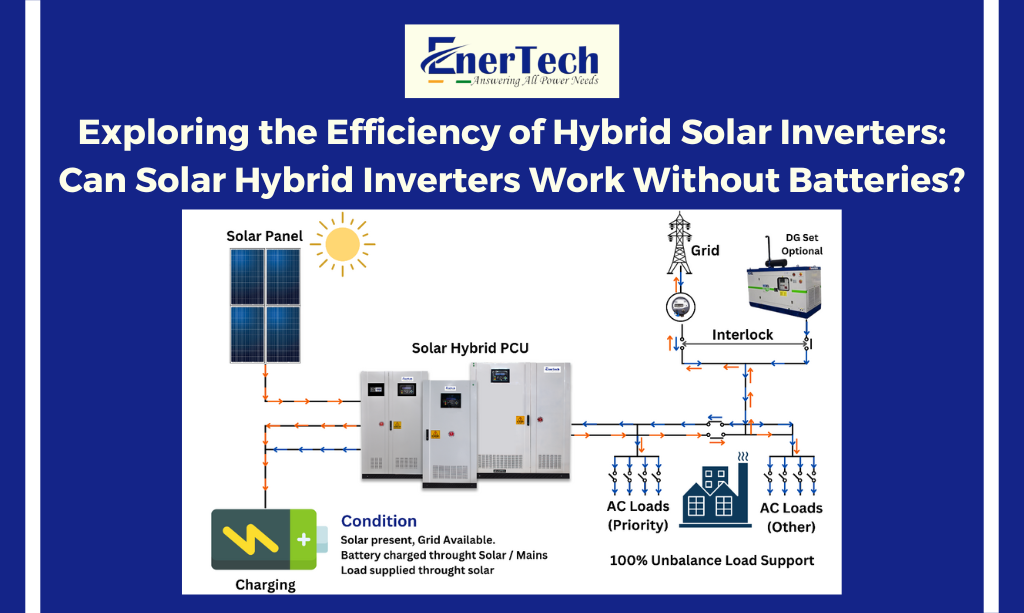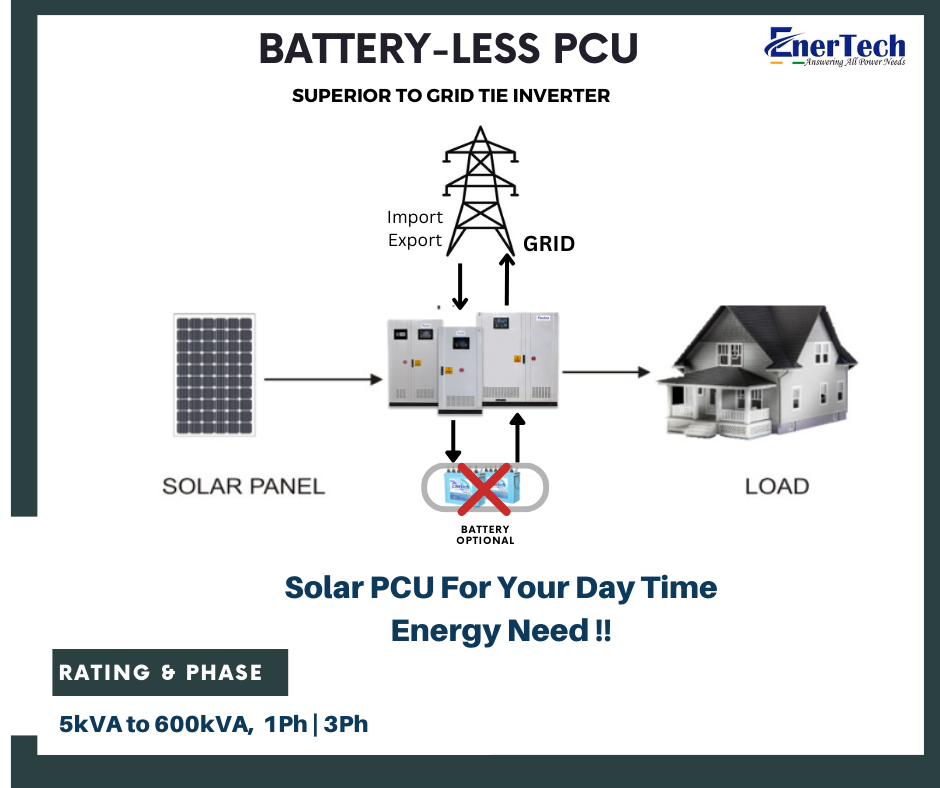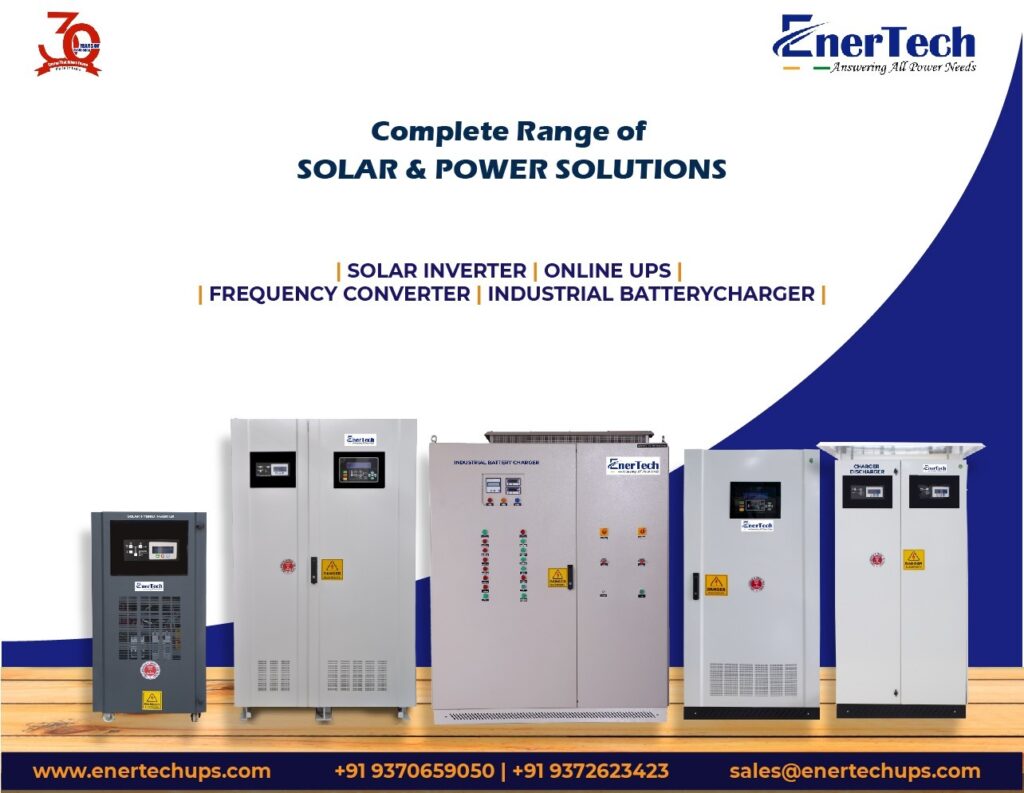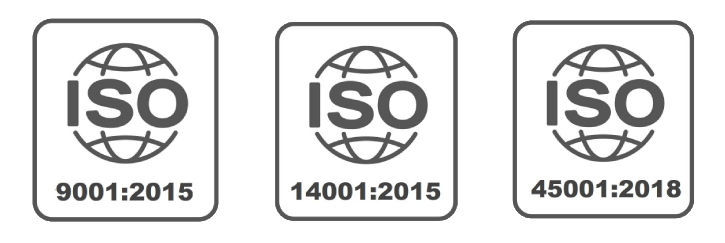In recent years, the surge in renewable energy solutions has led to significant advancements in solar technology. Hybrid solar inverters have emerged as a versatile solution that combines the benefits of both on-grid and off-grid systems. One common question that arises in discussions about hybrid solar inverter is whether they can operate efficiently without the inclusion of batteries. In this blog post, we will delve into the hybrid solar inverters work and explore the feasibility of their functionality of inverter without battery.
Understanding Hybrid Solar Inverters:
Hybrid solar inverters are designed to manage multiple power sources seamlessly. They integrate solar panels, grid power, and battery storage to optimize energy utilization. The primary function of these inverters is to convert direct current (DC) generated by solar panels into alternating current (AC) suitable for powering household appliances.
Role of Batteries in Hybrid Solar Inverters:
Batteries play a crucial role in hybrid solar setups, serving as energy storage devices. During periods of excess solar generation, surplus energy is stored in batteries for later use, such as during nighttime or cloudy days when solar production is lower. This capability ensures a steady power supply and allows users to become partially or entirely independent of the grid.
Why we need Battery less Solar hybrid Inverter ??
Discover the Future of Solar Power with Enertech’s Battery less Solar Hybrid Inverters!
Are you ready to redefine the way you harness solar energy? Look no further than EnerTech, the pioneering manufacturer of solar system without battery.
Enertech stands out as the sole manufacturer in the market offering Battery less Solar Hybrid Inverters that means inverter without battery. Say goodbye to traditional batteries and experience a more sustainable and efficient solar power solution.
Can Hybrid Solar Inverters Work Without Batteries?
While hybrid solar inverters are engineered to work seamlessly with batteries, they can indeed function without them. In a battery-less configuration, the hybrid inverter operates by utilizing the solar panels and drawing power directly from the grid when needed. This configuration is suitable for users who prioritize cost-effectiveness and do not require backup power during grid outages.
By understanding how hybrid inverters operate without batteries, users can make informed decisions based on their energy requirements and budget. This battery-less setup works best for locations with reliable grid supply and consistent daytime energy consumption, as it ensures uninterrupted power during sunlight hours. However, users aiming for greater energy independence, backup support during outages, or long-term savings through stored solar energy may find a battery-backed system more suitable. Evaluating your power usage patterns and backup needs will help determine which configuration aligns best with your goals.
Enertech’s Batteryless Solar Hybrid Inverters not only save you money on expensive battery replacements but also provide a cost-effective solution for harnessing solar energy. Enjoy long-term savings on your energy bills.
Advantages of Battery-less Hybrid Solar Inverters:
- Cost Savings: By eliminating the need for batteries, users can reduce the overall system cost significantly.
- Simplified Maintenance: Battery-less configurations are generally easier to maintain as they do not involve monitoring and replacing batteries.
- Grid Independence: Users can still benefit from solar power during the day while relying on the grid for power during non-solar hours.
- Efficient Daytime Usage: Ideal for users with high daytime energy consumption, as solar power is used directly.
-
Space Saving: No bulky battery storage units are required, making it suitable for locations with limited space.
- Eco-Friendly Option: Reduces battery-related waste and environmental impact.
To explore how hybrid systems enhance energy efficiency in industrial use, check out our detailed blog on the advantages of hybrid energy systems for industrial use.
Considerations for Battery-less Configurations:
- Grid Dependency: Users opting for a battery-less setup should be aware that their power supply is contingent on grid availability.
- Daytime Power Generation: The effectiveness of a battery-less configuration depends on sufficient solar power generation during daylight hours.
Conclusion:
In conclusion, a hybrid solar inverter work efficiently without batteries, offering a cost-effective solution for those seeking to harness solar power without the added expense of energy storage. Enertech, as India’s leading manufacturer of solar hybrid inverters, provides versatile solutions that cater to the diverse energy needs of consumers. Whether with or without batteries, the flexibility of hybrid solar inverters contributes to the sustainable and eco-friendly transition to solar energy.
Request Quote: Solar Hybrid Inverter 3Ph: REeFI
Make the smart choice for your solar power needs. Choose Enertech for a brighter, more sustainable future!
Frequently Asked Questions
1. Can a hybrid solar inverter work without batteries?
Ans: Yes, a hybrid solar inverter can function efficiently without batteries. In a battery-less configuration, the inverter utilizes solar panels and draws power directly from the grid when needed.
2. What is the primary function of hybrid solar inverters?
Ans: Hybrid solar inverters are designed to convert the direct current (DC) generated by solar panels into alternating current (AC), making it suitable for powering household appliances. They can seamlessly manage multiple power sources, including solar panels, grid power, and batteries.
3. Why might someone choose a battery-less configuration for their hybrid solar inverter?
Ans: Opting for a battery-less setup can be cost-effective, as it eliminates the expense of energy storage. Users who prioritize cost savings and do not require backup power during grid outages may find this configuration suitable.
4. What are the advantages of a battery-less hybrid solar inverter?
Ans: Advantages include cost savings, simplified maintenance (as there are no batteries to monitor and replace), and the ability to benefit from solar power during the day while relying on the grid for power during non-solar hours.
5. Is a battery-less hybrid solar inverter suitable for off-grid living?
Ans: While a battery-less configuration can be cost-effective, it is important to note that it makes the system dependent on grid availability. Users in off-grid scenarios may prefer systems with energy storage for continuous power supply.
6. Can a hybrid solar inverter with batteries provide backup power during grid outages?
Ans: Yes, one of the primary advantages of hybrid solar inverters with batteries is the ability to provide backup power during grid outages. The stored energy in batteries ensures a steady power supply even when solar production is low.
7. How does a battery-less configuration impact daytime power generation?
Ans: The effectiveness of a battery-less configuration depends on sufficient solar power generation during daylight hours. Users in regions with ample sunlight can benefit from this setup by utilizing solar energy during the day.
8. What considerations should be kept in mind when opting for a battery-less hybrid solar inverter?
Ans: Users should be aware of grid dependency and assess their power needs during non-solar hours. Additionally, the effectiveness of the system relies on the availability of sunlight for daytime power generation.
Tags: Hybrid Solar Inverter, Solar Technology, On-grid Solar, Off-grid Solar, Solar Panels, Grid-tied Inverter, Energy Efficiency, Cost-effective Solar Solutions, Grid-tied Inverter, Solar Inverter Functionality, Solar Energy Solutions, hybrid solar inverter without battery, off grid solar inverter without battery, hybrid inverter without battery









